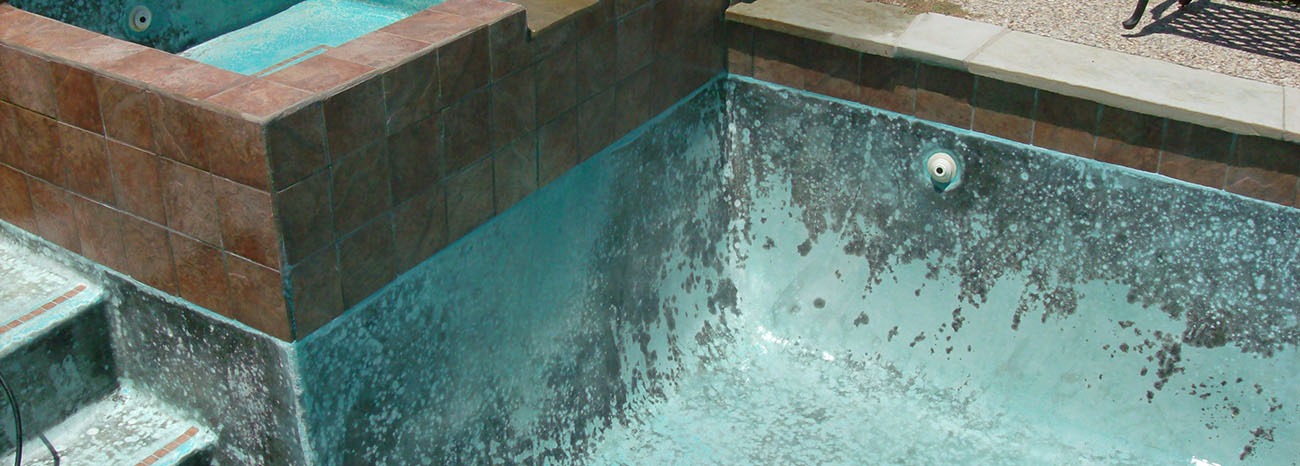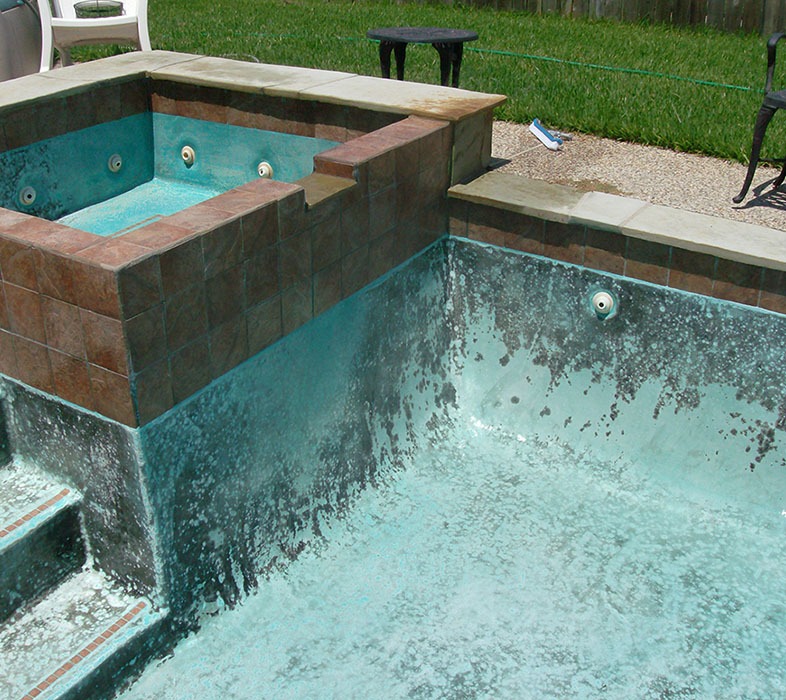Pool stains can ruin the overall appearance of your pool, making it difficult to enjoy a swim in your outdoor oasis. From hard stains to unsightly brown spots, pool stains can develop from a variety of sources. Before you take the DIY route to remove your stains using harsh chemicals, it’s important to understand where the origin of your pool stain comes from and deal with the source before treating it.
Types of Pool Stains
There are two categories of pool stains: organic and inorganic. This distinction is important so you can correctly identify, prevent, and address these stains before they turn into a bigger problem.
Organic stains often come from natural sources and materials like leaves, algae, and berries and form discolored patches or streaks on the pool’s surface. These stains thrive in environments rich in organic debris, highlighting how important regular cleaning and maintenance are important for stain prevention.
Stains from inorganic materials can be caused by metals and other minerals that are in the pool water. Iron, copper, and calcium sources create rust-colored stains with greenish hues on the pool walls. You might also see white scales floating on the surface of your pool water.
Characteristics of Organic Stains:
- They result from organic materials like leaves, twigs, and outside dust.
- Rotten leaves sitting in the pool water can release tannins, resulting in brownish stains.
- Algae growth can cause green or black discoloration on pool surfaces.
- Rotten berries and other fruits can leave colorful stains on pool surfaces.
Characteristics of Inorganic Stains:
- They result from metals and minerals present in pool water.
- Corroded pool equipment, such as metal ladder rails or bolts, can leak iron and copper into the water, which will cause rust or greenish stains.
- Water with high calcium levels can cause white scales to float on the pool’s surface.
- Chemical imbalances, such as high pH or chlorine levels, can exacerbate metal staining and increase mineral deposits.
Prevention Strategies for Pool Stains
A clean pool ready for you to enjoy requires proactive steps, including actions to prevent the formation of spots and marks.
Here are some ways you can maintain the overall health of your pool:
- Balanced Pool Chemistry: The right water chemistry will make it difficult for both organic and inorganic stains to form and grow. Imbalanced water chemistry can contribute to the formation of stains and other water quality issues. Regularly test and adjust pH, chlorine levels, alkalinity, and calcium hardness to ensure optimal water balance.
- Regular Cleaning and Maintenance: A regular cleaning routine is crucial for keeping your pool free of the debris and bacteria that can lead to staining. Skim the surface, vacuum the pool floor and brush the walls and tile regularly to remove organic materials and prevent algae growth. Clean out the filters and skimmer baskets daily.
- Water Softeners and Metal Sequestrants: In areas with hard water or high metal content, using water softeners and metal sequestrants can help prevent staining caused by metals like iron, copper and calcium. These products bind to metals in the water, preventing them from precipitating out, and staining pool surfaces.
- Pool Cover: When the pool is not in use, it is recommended to use a pool cover to more effectively keep dying leaves and other debris out of the water. Pool covers retain the water’s heat and reduce further evaporation, leading to lower energy costs and water conservation. If you have internal pool equipment like a pool ladder, using a pool cover will also prolong its use and the health of its metal components.
- Regular Professional Inspections: Schedule regular inspections with a pool professional to check the condition of your pool and identify any potential issues that could lead to staining. A professional can recommend preventive measures tailored to your pool’s specific needs and address any underlying issues before they escalate. A regular pool maintenance schedule can help keep your pool looking its best and prevent long-term damage.
Diagnosing and Treating Pool Stains
It’s important to quickly address pool stains as soon as you notice them. If you have followed a consistent pool cleaning and maintenance schedule and still have stains, consider the following steps to diagnose and treat these stubborn pool stains:
- Identify the Type of Stain: Is your stain organic or inorganic? Look around your pool for organic indicators like leaves, algae or other natural materials that might be decomposing in the pool. Also check if there are any metals and minerals like copper or calcium floating in your pool.
- Diagnose the Cause: Now that you know the type of stain, determine the root cause. Consistent organic staining is an indicator of bad pool water circulation or a dirty filter. Inorganic stains are a sign of possible corrosive metal in the water or an imbalance in pool water chemistry.
- DIY Cleaning Solutions: For mild pool stains, you can often treat them with DIY cleaning solutions using household ingredients. Vitamin C (ascorbic acid) can be effective in removing iron stains, while muriatic acid can help dissolve calcium deposits. Follow manufacturer instructions and safety precautions when using cleaning chemicals, and always test solutions in a small area first before applying them to the entire stain.
Professional Stain Removal by Moyer Pool & Spa
Struggling with stubborn stains in your pool? Let the experts at Moyer Pool & Spa help you. We offer professional stain removal services that can restore the beauty, clarity and safety of your pool. Our team uses specialized equipment and advanced techniques to effectively tackle the most persistent stains. Don’t let stains spoil your pool season — contact Moyer Pool & Spa today!

